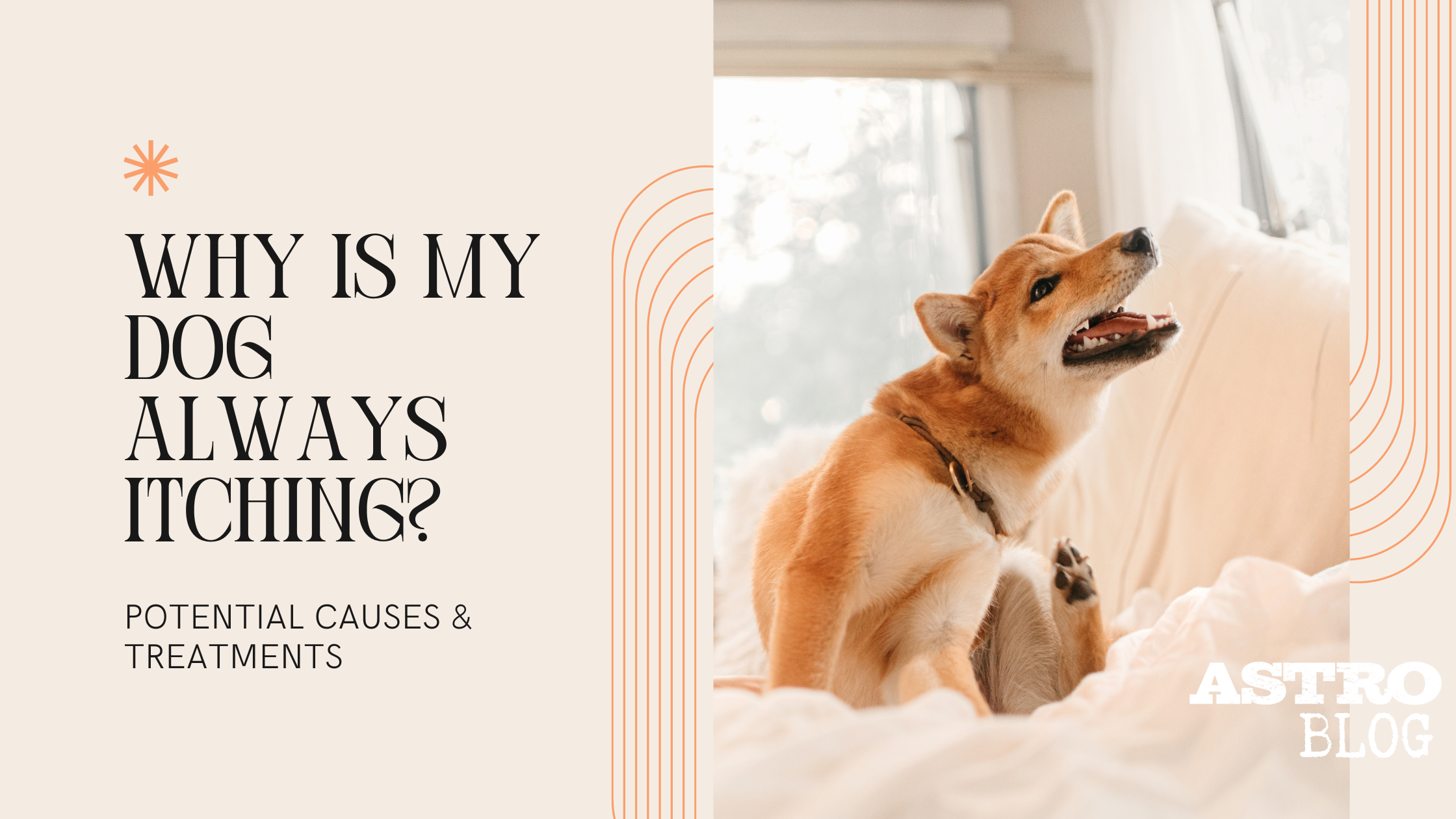Are you noticing that your dog has been itching or scratching a lot more than usual lately? There are many reasons your dog might have itchy skin, also known as pruritus in dogs. The occasional dog scratches are nothing to be concerned about, but if you’re noticing your dog is excessively scratching, it could lead to problems in the future. Pet health is important, and constant licking and scratching can make your dog uncomfortable. They can lead to secondary health issues if not dealt with properly, such as skin infections, hair loss, inflammation, and body odor.
Let’s go over some of the potential causes behind dogs that excessively scratch, as well as some options for treatment.
Potential Causes for Itchy Dog’s Skin
Pruritus in dogs is commonly caused by skin allergies or diseases, and it also may depend on environmental factors. The dogs most prone to developing allergy-related skin diseases include breeds like Golden Retrievers, Bulldogs, and Poodles. Here are some potential causes to keep an eye out for with your dog:
Environmental Factors

Winters can lead to periods of dry, cracked skin. Mite and flea bites are also more common during the spring and summer, so you should watch out for your dog’s skin during those seasons as well. Pollen and mold appearing in spring might also trigger allergic reactions. Dogs with environmental allergies will have red itch marks around their face, paws, and belly.
Flea Allergy Dermatitis

This is the most common source of itching in dogs. Whether your dog is bothered by a flea allergy or some other sort of allergic reaction, they can be annoying or even painful for your pooch to deal with. Flea bites can be found anywhere on the body, but most commonly appear on your dog’s hind legs, the base of the tail, and rear end. You may even find flea dirt (flea fecal matter) on your dog — they look like little black specks and are a sure sign fleas are present.
Food Allergies

Itching is one of the most common side effects of food allergies in dogs. Your dog might develop hives 6 to 24 hours after eating something they’re allergic to. Common food allergies in dogs include chicken, eggs, beef, dairy, corn, wheat, and other food products. Look for itch around your pet’s belly, armpits, paws, and face. A food allergy might also trigger tummy trouble or a bloated face.
There are rare instances where a prescription diet may be the only option to overcome a tricky allergy – but oftentimes, your neighborhood pet shop can be an invaluable resource for helping you isolate the cause of your dog’s allergy and eliminate it from their diet. As someone who has conducted numerous nutrition consults for itchy dogs, I have seen most of them recover and flourish after being transitioned to a raw diet. Good nutrition can perform miracles!
Atopic Dermatitis

This is also another common skin diseases in both dogs and cats. When allergies become severe enough, they can lead to skin disease. Atomic Dermatitis is brought on by allergies and is an inflammatory, chronic condition. Allergic reactions can be brought on by contact with grass, mold, house dust mites, and more.
Sarcoptic Mange

Also called Scabies, this troublesome disease is caused by a parasitic mite that burrows just beneath the surface of the skin. This causes intense itching for the dog because the presence of the mite is extremely uncomfortable for them. This leads to hair loss and darkened skin in the itchy areas.
This disease is contagious and can be transmitted to humans. You should see a vet right away if your pet develops scabies. The vet might prescribe your dog medicine such as topicals, baths and dips, injections, or pills to treat the issue. Follow their advice; treatment will depend on your dog’s breed, age, and other factors.
How to Treat Itching in Dogs
It’s hard to see the animals we love suffer, and constant itching can be uncomfortable and even painful for dogs. Luckily, there are a multitude of ways to treat itchy dogs and return them to their old happy selves. First things first, you should schedule an appointment with your vet. They can help diagnose the real problem behind your pup’s itching and provide advice on how best to treat them.
Here are a couple of treatments you can try:
- Seek out a nutrition consult. If your vet determines your dog’s allergies are caused by their diet, before going down the prescription diet route, consult with a holistic vet or a dog nutritionist. Many independent pet shops have a nutritionist on staff who can coach you through the process of isolating the allergen and removing it from the diet while, in turn, introducing supplements and foods that will help heal your pup’s digestive lining (if the itching is related to leaky gut) and cultivate a healthy gut flora – which often eliminates the allergy outright! This holistic approach is centered around getting to the root of the issue and giving the body the tools it needs to heal itself rather than just treating the symptoms of the underlying issue. It’s truly amazing what good food can do!
- Anti-itch coat treatments could help. There are many shampoos and oils available in pet stores that can help soothe dry, cracked skin. Look for products that have ingredients like coconut oil or are marked as anti-inflammatory. But don’t overdo it! Bathing a dog too frequently can also cause dry skin and itching. One bath every one to three months is ideal.
- Prescription steroids, prescribed by your vet, may be helpful in reducing allergic itch caused by their environment, but they do have side effects like increased thirst, urination, and weight gain.
- Try a home remedy — chamomile and green tea baths, oatmeal baths, and aloe vera treatments may soothe your dog’s discomfort.
Your dog’s health is important— you want to do everything you can to make sure your furry best friend is comfortable and happy. If you notice your dog is itching, take action! The sooner you tackle the issue, the sooner your dog will be able to recover. Constant itching and scratching is no picnic, whether you’re a dog or a human. Check out more tips and tricks on Astro Loyalty’s blog!








